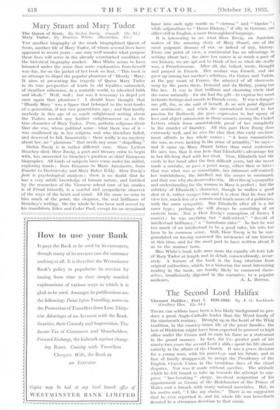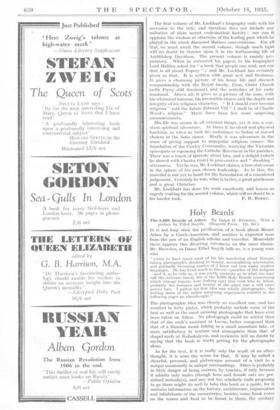The Second Lord Halifax
Viscount Halifax : Part I. 18391885. By 3. G. Lockhart: ' (Geoffrey Bios. 12s. 6d.) Viscount Halifax : Part I. 18391885. By 3. G. Lockhart: ' (Geoffrey Bios. 12s. 6d.) THERE can seldom have been a less likely background to pro- duce a great Anglo-Catholic leader than the Wood family of the nineteenth century. Brought up in the heart of the Whig tradition, in the country-house life of the great families, the heir of Hickleton might have been expected to proceed to high office under the Crown and to earn his fame as a statesman in the grand manner. In fact, for Via. greater part of his ninety-two years the second Lord 1. all& spent his life almost entirely in the affairs of the Church. It was a grave decision for a young man, with his pareetage and his future, and in face of family disapproval, to accept the Presidency of the English Church Union in the troublous days of the ritual disputes. Nor was it made without sacrifice. The attitude which he felt bound to take up towards the attempt to sup- press " law-breaking " clergy, involved resignation of his appointment as Groom of the Bedchamber of the Prince of Wales and a breach with many natural associates. But, as his motto said, " I like my choice." There is no suggestion that he ever regretted it, .and his whole life was henceforth devoted to a strenuous devotion to that cause. The first volume of Mr. Lockhart's biography ends with his accession to the title, and therefore does not include any nalilttive of 'pi* recent ecejesiastical histikir ; nor can it apptaise the wisdom or otherwise of the leading part which he played ,in the rhuch discussed 'Malines converslitions. For all that we must: await the second volume, thoUgh much-light will no doubt:lie thrown upon it in the forthcoming life of . Archbishop Davidson. The present volume . is mainly, pre- paratory. VViien he entrusted his papers to his biographer Lord Halifax asked for " a book that people can read, not one that is all about Popery " and Mr. Lockhart has certainly given us that. It is written with great zest and freshness. It gives a charming picture • of his home life and discreet companionship with the Royal family, Eton, Christ Church (with Pusey still dominant), and the activities of his early manhood. Above all, it gives us a picture of the man, with his whimsical humour, his irresistible charm and the depth and integrity of his religious character. " If I should ever become religious " said the future Edward VII " I shall be of Charlie Wood's religion." There have been few more surprising announcements.
His life was secure in all external things, yet it was a con- stant spiritual adventure. At times it involved real physical hardship, as when he took his ambulance to Sedan or nursed cholera in the Soho slums. Mostly it was adventure in the sense of giving support to unpopular religious causes—the foundation of the Cowley Community, harrying the Victorian episcopate or espousing the Catholic Movement in the parishes. There was a touch of Quixote about him, and a delight (which he shared with Charles Gore) in provocative and " shocking " utterances. Yet he was, Mr. Lockhart claims, a true statesman in the sphere of his own chosen leadership. As to this, the material is not yet, to hand for the formulation of a considered judgement. Certainlyhe was, what is better; a great gentleman and a great Christian.
Mr. Lockhart has done his work excellently add leaves us eagerly waiting for the second volume, which will no doubt be a



























































 Previous page
Previous page